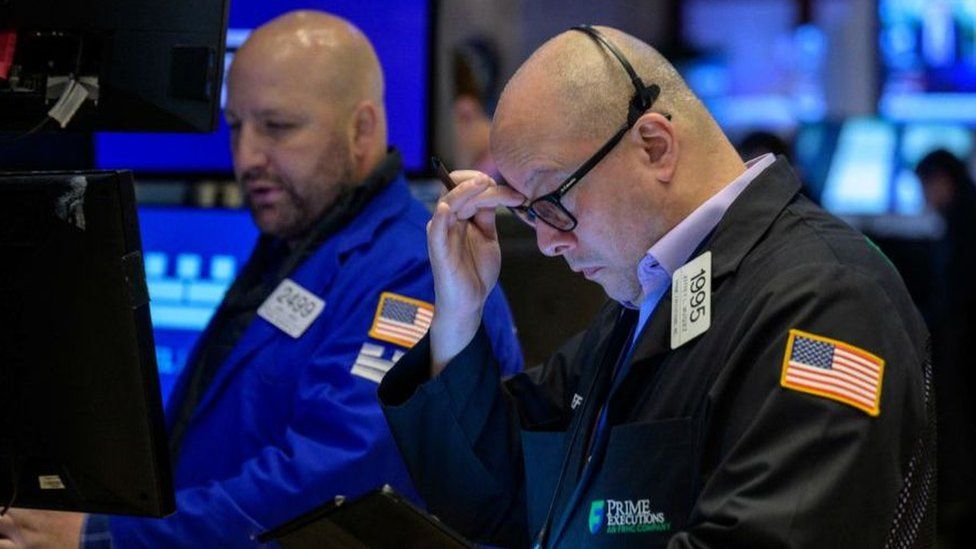ARTICLE AD BOX
 Image source, Getty Images
Image source, Getty Images
As negotiations drag on, investors appear to be considering what comes next
By Natalie Sherman
Business reporter, New York
Negotiations to prevent the US government from running out of money are going down to the wire.
The Treasury says Congress must agree to raise the debt ceiling by 1 June or the US will run out of cash to pay its bills, resulting in economic disaster.
Top congressional Republican Kevin McCarthy says his party and the Democrats are still "far apart".
So with just over a week left - including a holiday weekend - are investors finally getting nervous?
Mark Lindbloom, of California-based Western Asset, which has more than $400bn (£322bn) in assets under management, said there is "fear-mongering" from politicians and the media.
"That scares people so yes, people are asking about it."
The three big stock indexes were all trading lower on Wednesday, extending falls from a day earlier. Analysts say they expect Wall Street to remain on edge the closer it gets to 1 June.
But for most of the month, markets have remained remarkably unmoved, betting that a deal will get done.
"A lot of investors are looking at this situation thinking they've seen this movie before and they know how it ends," says Dave Sekera, chief US market strategist at Morningstar, which works with big money management firms.
"There will be a lot of dire headlines in the media and the politicians will certainly be out there to try to score political points with their base, but there will be some sort of arrangement or agreement before you get to a payment default."
On Wednesday, the House of Representatives Speaker, Mr McCarthy, once again sought to allay fears that the US could veer off the fiscal cliff next month.
"We're not going to default," he told reporters at the Capitol.
But stress over the situation has surfaced in select pockets of the market.
Watch: The debt ceiling explained - in under 90 seconds
Investors are demanding higher payments in exchange for holding short-term US government bonds that could be most affected by a default.
Gold, which investors often turn to at times of risk, has received a boost since the start of the year, and buyers have seemed unusually enthusiastic about certain corporate debt.
"This has been a very nuanced market reaction," said Eric Theoret, global macro strategist at Manulife, noting that the frequency of debt stand-offs over the last decade has many investors betting that this episode, like those, will be little more than a "short-term blip".
As of Monday, he said, the wider market "was not trading like it is at all concerned".
But even if a deal is reached, market risks remain.
In 2011, the last time Democrats and Republicans appeared at such fiscal odds, the most severe turmoil happened after a deal was struck.
Shares saw their steepest falls since the 2008 financial crisis, amid worries about the impact of the spending cuts made to get the agreement and the implications of a downgrade in America's bond rating by one credit rating agency.
Despite the alarm back then, dire predictions that the US could face permanently higher borrowing costs because of the damage to its reputation as a borrower proved unfounded.
Analysts say they believe the possibility of another downgrade is remote this time, but the three ratings firms have signalled they are closely watching what is happening in Washington.
Fitch warned in April that "repeated near-default episodes... could erode confidence that the US government's repayment capacity is resilient to political dysfunction and may affect Fitch's view of the sovereign credit profile".
"It's certainly stressful to watch," said Rob Williams, managing director of financial planning and wealth management at financial firm Charles Schwab, which he said was fielding queries from pensioners and others about how to handle the situation.
He said his team was advising nervous clients to look past the headlines: "If you have a plan in place and your circumstances haven't changed, stay the course."
Mr Lindbloom said Western Asset is also trying to reassure clients that a deal will be reached as it has dozens of times before.
"This is political theatre, this is the show," he said. "It's ugly at times but it's how our system works."

 1 year ago
37
1 year ago
37








 English (US) ·
English (US) ·